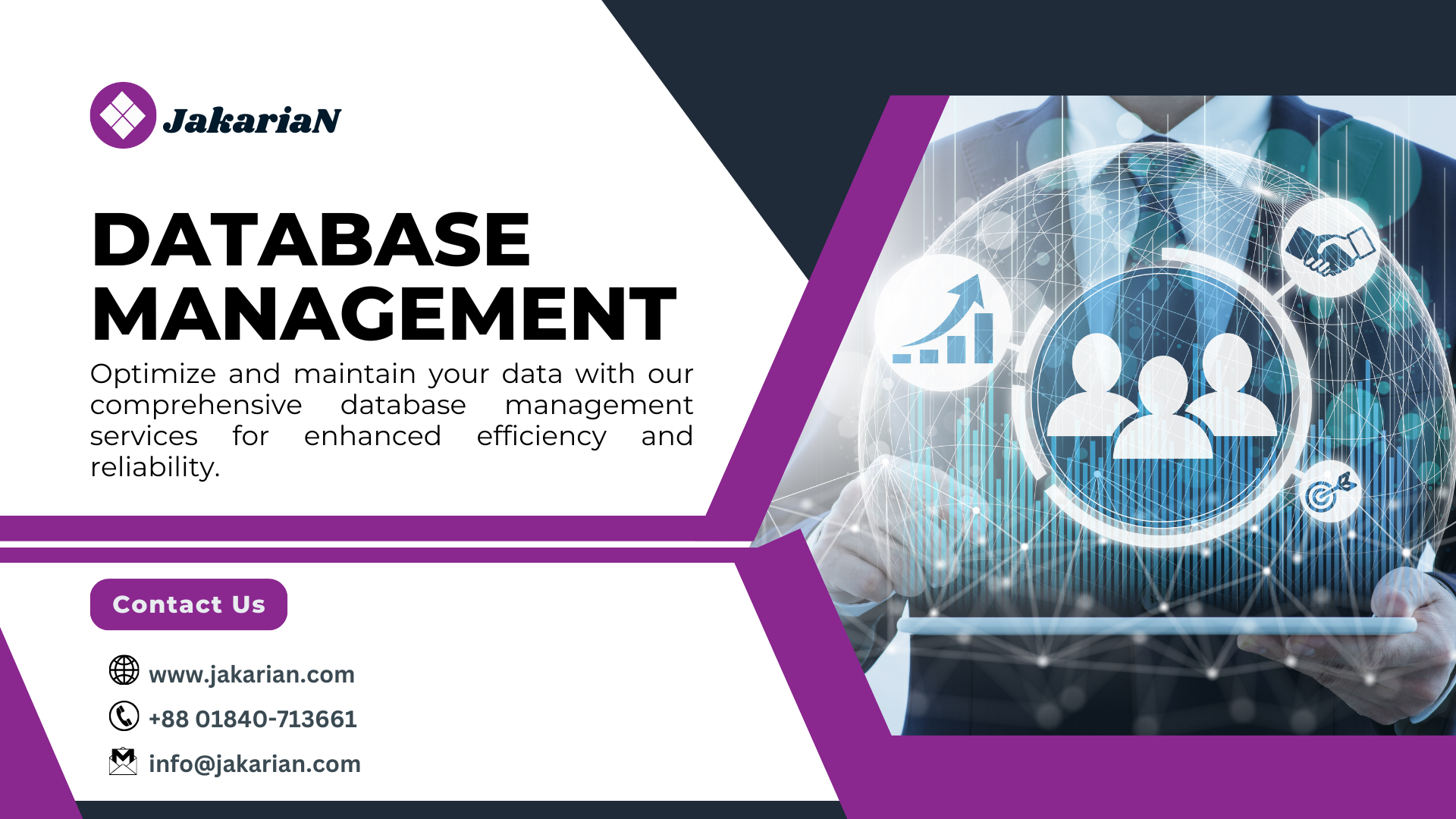Database Management
Database Management involves the systematic organization, maintenance, and administration of databases to ensure data is stored efficiently, remains accessible, and supports the needs of users and applications. This service is crucial for businesses and organizations that rely on databases to handle and analyze large volumes of information, facilitate transactions, and support decision-making processes. Key aspects of Database Management include:
1. Database Design and Architecture:
- Schema Design: Designing the structure of the database, including tables, fields, relationships, and constraints, to ensure it supports the organization’s data requirements and business processes.
- Normalization: Applying normalization techniques to reduce data redundancy and improve data integrity, organizing data into related tables to minimize duplication.
2. Database Implementation:
- Database Creation: Setting up and configuring databases based on the designed schema, including creating tables, indexes, views, and other database objects.
- Data Migration: Migrating data from existing systems or sources into the new database, ensuring a smooth transition and preserving data accuracy and consistency.
3. Data Storage and Retrieval:
- Data Insertion and Update: Managing the insertion, updating, and deletion of data within the database, ensuring data integrity and accuracy through proper transaction handling.
- Query Optimization: Developing and optimizing queries to retrieve data efficiently, improving performance and reducing response times for data access.
4. Database Security:
- Access Control: Implementing security measures to control user access, including setting up user roles, permissions, and authentication methods to protect sensitive data.
- Data Encryption: Using encryption techniques to secure data both at rest and in transit, safeguarding it from unauthorized access and breaches.
5. Backup and Recovery:
- Backup Strategies: Implementing regular backup procedures to ensure that data is preserved and can be restored in case of loss, corruption, or system failure.
- Disaster Recovery: Developing and maintaining disaster recovery plans to ensure data can be quickly and effectively recovered following significant incidents or outages.
6. Performance Monitoring and Tuning:
- Database Performance: Monitoring database performance metrics such as query response times, transaction rates, and resource utilization to identify and address performance issues.
- Optimization: Tuning database settings, indexes, and queries to enhance performance, ensuring efficient operation and optimal resource usage.
7. Data Integrity and Validation:
- Data Validation: Implementing constraints and validation rules to ensure that data entered into the database adheres to defined formats, ranges, and relationships.
- Integrity Checks: Performing regular checks to ensure data integrity, identifying and resolving issues related to data accuracy, consistency, and reliability.
8. User and Role Management:
- User Management: Creating and managing user accounts, roles, and permissions, ensuring that users have appropriate access levels based on their needs and responsibilities.
- Audit Trails: Maintaining audit trails and logs of user activities, changes, and transactions within the database to track usage and ensure accountability.
9. Documentation and Reporting:
- Database Documentation: Keeping comprehensive documentation of the database design, schema, and configurations, providing a reference for future maintenance and development.
- Reporting: Generating reports and dashboards that summarize database performance, usage statistics, and other relevant metrics to support decision-making and analysis.
10. Continuous Maintenance and Updates:
- Regular Maintenance: Performing routine maintenance tasks such as database reorganization, cleanup, and updates to ensure ongoing stability and efficiency.
- Software Updates: Applying patches and updates to database management systems (DBMS) to fix vulnerabilities, enhance features, and ensure compatibility with other systems.
Database Management is essential for ensuring that data is organized, secure, and accessible, enabling organizations to leverage their data effectively for operational and strategic purposes. By managing the lifecycle of databases from design through maintenance, this service supports the integrity, performance, and security of critical data assets.
Compare Our Packages
| No | Package | Basic | Standard | Premium |
|---|---|---|---|---|
| 01 | Description | |||
| 02 | Title optimization | |||
| 03 | ||||
| 04 | ||||
| 05 | ||||
| 06 | ||||
| 05 | ||||
| 06 | ||||
| 07 | ||||
| 08 | ||||
| 09 | ||||
| 10 | ||||
| 11 | ||||
| 12 | ||||
| 13 | ||||
| 14 | ||||
| 15 | ||||
| 16 | ||||
| 17 | ||||
| 18 | ||||
| 19 | ||||
| 20 |







Leave a Reply